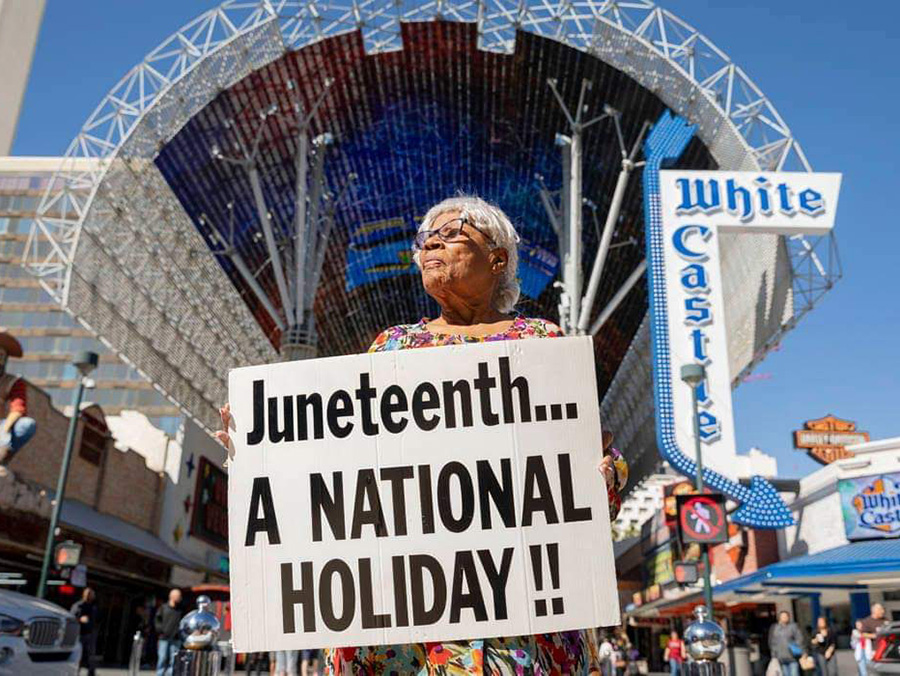Miles to Go
Opal Lee's ('63 M.Ed.) tireless activism led to Juneteenth being designated a federal
holiday.
April 8, 2022
It's been a banner few months for Opal Lee ('63 M.Ed.). In December, the 95-year-old civil rights icon was named The Dallas Morning News' Texan of the Year, followed by a Nobel Peace Prize nomination in February. Ask her
about these extraordinary designations, and the longtime Fort Worth resident shrugs
them off. For Lee, there's no such thing as a capstone accomplishment.
"I feel like a lady who's got a whole lot left to do," says Lee, a retired educator who is widely known as the Grandmother of Juneteenth. "I'm not gonna rest on my laurels."
It makes sense for a woman who has been a lifelong adversary of can't. As a guidance and elementary education major at UNT, she jumped in her car — "so old I had to stick a hairpin in to keep it going"— and headed off to Denton with her four kids in tow (three attended North Texas with her, while her youngest was enrolled in the Laboratory School). As a burgeoning civil rights advocate and co-founder of the Tarrant County Black Historical and Genealogical Society, she watched as Fort Worth officials unplugged Sycamore Park's lights at 10 p.m. to send Juneteenth celebrators home — until she jumped on a flatbed truck and plugged the lights back in. "We had fun until dawn," she says.

And in 2016, as the reigning voice in the movement to make Juneteenth a national holiday, the then 89-year-old Lee embarked from Fort Worth and walked 2.5 miles each day in cities across the U.S. before reaching Washington, D.C. — a distance steeped in symbolism as Juneteenth marks the date that slaves in Texas learned of their freedom a full 2.5 years after the signing of the Emancipation Proclamation. Lee's nearly four-month — and 1,400-mile — expedition (which started in September 2016 and concluded in January 2017) led to 1.6 million signatures on a petition for Congress to formally recognize the global importance of the day.
Four years later, in spring 2021, the White House called. President Biden planned to designate Juneteenth the 11th federal holiday. Could she be there for the signing?
I hope that people will realize that by working together against the disparities we have now, we can get so much done — and so much sooner.
"We got there the next day," says Lee, who credits the late Rev. Ronald Myers — with whom she served as a board member of the National Juneteenth Observance Foundation — for impressing upon her Juneteenth's rightful place among national holidays. "During the signing, I thought, ‘How wonderful that the whole world can celebrate Juneteenth. That finally people can see it was freedom for everybody — not just for the enslaved or for Black people or for Texans. For everybody.' And then I thought, ‘We should celebrate from June 19 to July 4.' Now that would be a celebration."
After a lifetime devoted to advocacy and the greater good, most people would consider their to-do list complete. But most people aren't Opal Lee. There are still so many issues to address, she says. Like education ("We can't let people remove books from schools that tell our real history"); equity ("We've got to tackle joblessness and homelessness and health care that some people can get, and others can't"); and climate change ("I contend that if we don't get busy cleaning up our Earth, we're all going to Hell in a handbasket").
But from years of experience, she can tell you the good news is this: We can do it — together.
"Most of us all want the same things: a decent place to live, a job that pays enough for us to have food and a car and a house of our own, to be able to send our children to college. Everybody wants this way of life," she says. "I hope that people will realize that by working together against the disparities we have now, we can get so much done — and so much sooner."
Watch President Biden pay tribute to Opal Lee before signing the Juneteenth bill.